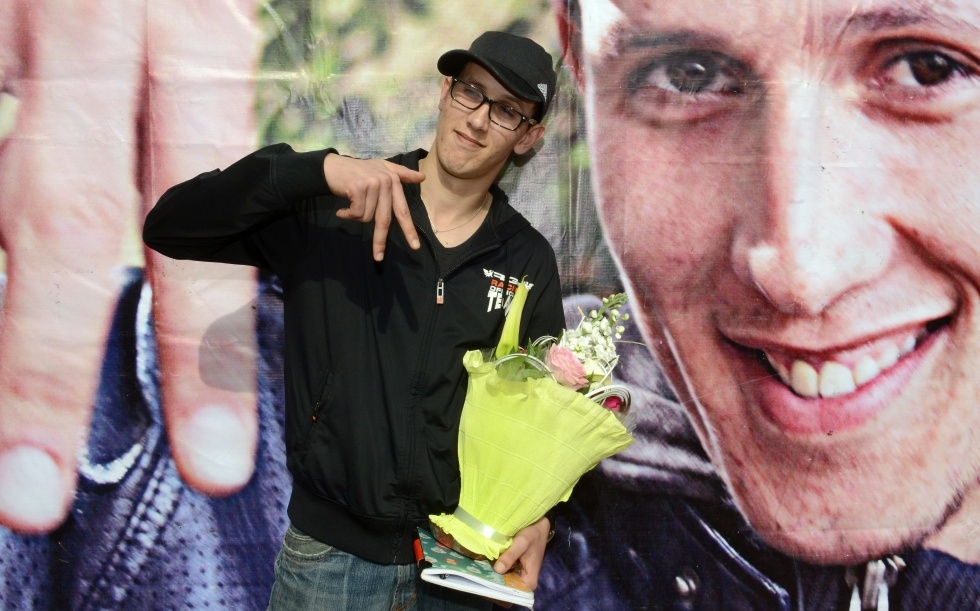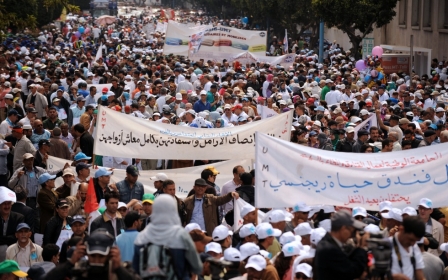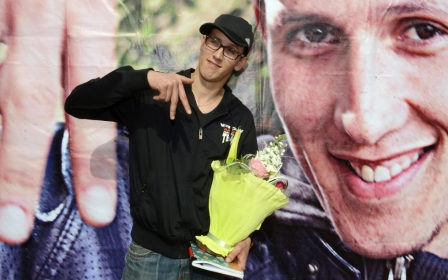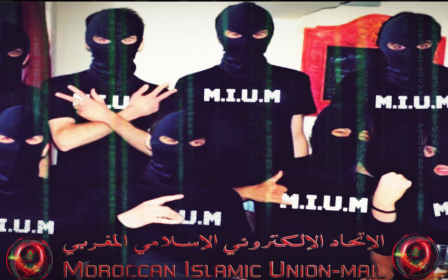Pro-democracy Moroccan rapper given four month jail sentence

Popular Moroccan rapper Mouad Belghouat was jailed for four months on Tuesday, convicted of being drunk in public and assaulting police officers.
Belghouat, also known as el-Haqed (the Enraged), will spend two and a half months in prison, having been detained at Casablanca’s Oukacha prison since his arrest in May, and will pay 15,000 dirhams ($1,850) to the two police officers who filed charges against him as well as a fine of 500 dirhams ($60).
He was arrested on 18 May at a football stadium in Casablanca and accused by police of selling black market tickets, although these charges were dropped during the trial. Belghouat’s brother, Hamza, who was with at the time of his arrest, says police officers beat Mouad before handcuffing him and taking him to a local police station.
Tuesday’s ruling was delivered in the absence of the musician’s lawyers, who left the last hearing complaining the court had not complied with any of their demands, including summoning the police officers who brought the charges and the defence witnesses.
Mohamed Messaoudi, one of Belghouat’s lawyers, spoke to AFP after the ruling on Tuesday, describing the verdict as “unjust” and the trial “unfair”.
“Mouad is the victim of those who arrested and threw him in prison, he is certainly not a suspect,” Messaoudi said.
Human Rights Watch said the case raised concerns that the court had “convicted him because of his political message” and called for an appeal to be fairly heard.
“This wouldn’t be the first time that what looks like an unfair trial on common criminal charges has served to silence a persistent critic in Morocco,” said Sarah Leah Whitson, Middle East and North Africa director at Human Rights Watch. “Any appeals trial should fairly weigh all the evidence in the case, and hear all relevant witnesses,” she added.
This is third time Belghouat has been jailed, with authorities having previously convicted him for an altercation with a royalist in 2011. He was also sentenced to one year in prison in 2012 on charges that included threatening national security for his song “Kleb al-Dawla” (Dogs of the State). The track’s video included a cartoon of a donkey-headed police officer and featured lyrics criticising police corruption.
“You are paid to protect the citizens, not to steal their money,” says one lyric. “Did you commander order you to take money from the poor?” says another.
The rapper has worked closely with the pro-democracy February 20 movement, which demands extensive political reform in Morocco, and his song “Baraka Men Skat” (No More Silence) become its anthem during street protests in 2011.
The chorus of “No More Silence” included the lyric: “They exploit our wealth and leave the crumbs for us, while so many freedom fighters died on our behalf.”
King Mohammed VI, the country’s ruler, has responded to calls for political reform by passing a new constitution and promising initiatives to tackle corruption, improve respect for free expression and protect the judiciary’s independence.
Activists, however, say reforms have failed to deal with systemic issues and police abuse.
“If the media say Morocco has got better because of reforms, it does not reflect the reality of life here,” Maria Karim, visual artist and friend of Belghouat, told MEE last month. “The truth is things are scary and the tyranny is horrible – many activists have been arrested and detained for up to a year because of taking part in unauthorised protests,” she added.
“There haven’t been any real reforms on the ground.”
New MEE newsletter: Jerusalem Dispatch
Sign up to get the latest insights and analysis on Israel-Palestine, alongside Turkey Unpacked and other MEE newsletters
Middle East Eye delivers independent and unrivalled coverage and analysis of the Middle East, North Africa and beyond. To learn more about republishing this content and the associated fees, please fill out this form. More about MEE can be found here.




